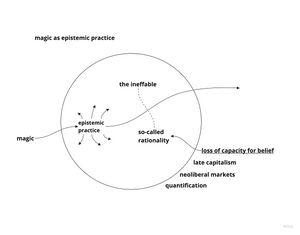Toward a Minor Tech:Xenodata-500

Spirit Tactics: (Techno)magic as Epistemic Practice
xenodata co-operative (Alexandra Anikina, Yasemin Keskintepe)
Speculative narratives of (techno)magic such as those offered by feminist technoscience, cyberwitches and techno-shamanism come from knowledge systems long marginalised in a hyper-optimised and hard-science-reliant capitalist discourse. Aiming to de-centre Western rational imaginaries of technology, they speak from alternative epistemic positions, decolonial and translocal perspectives. But what exactly does it mean to appeal to “magic” in the age of hegemonic Western epistemics? How do we deal with magic in the context of resistant tech practices?
Magic, as considered here, activates a different modality of the word “belief” than the commodified beliefs within capitalism. Rather, belief stands for a long-denied possibility of an alternative political imaginary (one that, as Mark Fisher suggests, is excluded within capitalist realism). Within this system, belief can only be exercised within the confines of certain institutions and framings: a church, a hospital, a rave, an art space. This is the core provocation of magic: it activates the systems of belief in spaces where they are not supposed to be activated.
Technology, in relation to magic, could also be liberated from being a despirited tool (a hammer), or from being a magic-wand type solution to the world’s problems; (techno)magic activates a reality-system of magic in certain space-times inside techno-capitalist infrastructures. At the same time, magic is not a universal solution to capitalism; it's not possible to exit into magic as some kind of an innocent primordial state. Magic is a granular, messy middle situated between sliding and not always matching scales of epistemic conditions, beliefs and politics.
(Techno)magic alters infrastructures, procedures and protocols, introducing the ineffable, 'that which cannot be captured by descriptive language, and which escapes all attempts to put it to "work"' (Campagna 10) - including not only human physical labour but also data put to work within statistical models. Yet, by animating the thought process, magic opens it to the possibility of the Other, and makes apparent the flows of (political) energy as an embodied experience. We understand (techno)magic as relational ethics + capacity to act beyond the constraints of the current capitalist belief system. (Techno)magic is about disentangling from libertarian, commodified, power-hungry, toxic, conquering forms of belief and knowledge; and instead cultivating solidarity, relationality, common spaces and trust with non-humans: becoming-familiar with the machine.
Artists do this by means of rituals: Choy Ka Fai weaves (motion capture) technology within shamanistic dance rituals in his audio-visual performance Tragic Spirits, and Omsk Social Club creates Live Action Role Plays (LARP)that introduce communal “states that could potentially be fiction or a yet unlived reality” (Omsk). Both facilitate a bodily encounter with the reality-system of magic, a transgression into imaginary politics and other worlds.
We propose to take magic seriously as an ethical and epistemic practice. We appeal to a tentative future: thought becoming operationalised as we engage in thinking-with diagrams and use diagrams as rituals-demarcated-in-space; finding solidarity with our dead - ancestors, but also crude oil - in the face of the Anthropocene; rituals against forgetting; making technospirits and conjuring worlds.